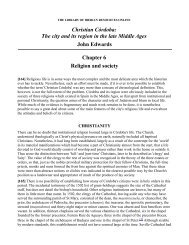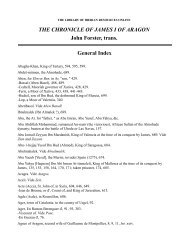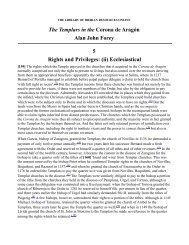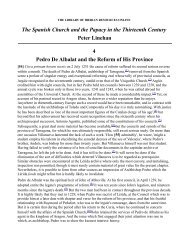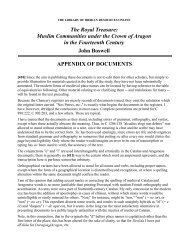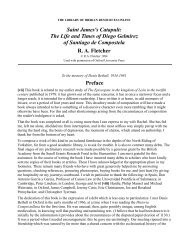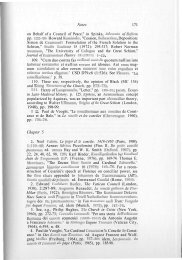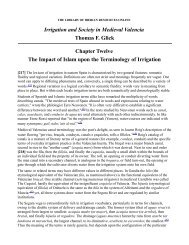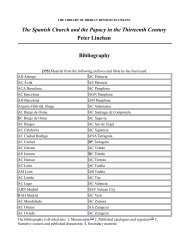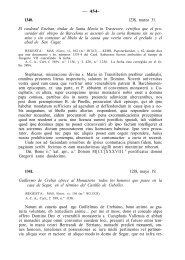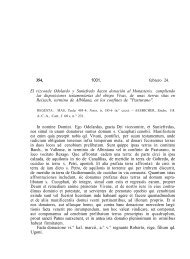PROTESTANTISM - The Library of Iberian Resources Online
PROTESTANTISM - The Library of Iberian Resources Online
PROTESTANTISM - The Library of Iberian Resources Online
Create successful ePaper yourself
Turn your PDF publications into a flip-book with our unique Google optimized e-Paper software.
conversion for, when at liberty, they will be free to repeat the <strong>of</strong>fence. . . . <strong>The</strong> admission to mercy was<br />
not provided for cases like these for, in addition to their enormity, from what you write to me, it<br />
appears that in another year, if unchecked, they would have dared to preach in public, thus inferring<br />
their dangerous designs, for it is clear that they could not do so without organization and armed leaders.<br />
It must therefore [435] be seen whether they can be prosecuted for sedition and disturbance <strong>of</strong> the<br />
republic, thus incurring the penalty <strong>of</strong> rebellion without mercy." He goes on to instance his own cruel<br />
edicts in the Netherlands, under which the pertinacious were burnt alive and the repentant were<br />
beheaded, a policy which he urged Philip to continue and which the latter practised in England, as<br />
though he were its natural king, leading to so many and such pitiless executions, even <strong>of</strong> bishops.<br />
"<strong>The</strong>re must" he concluded "be no competencias <strong>of</strong> jurisdiction over this, for believe me, my daughter,<br />
if this evil be not suppressed at the beginning, I cannot promise that there will be a king hereafter to do<br />
it. So I entreat you, as earnestly as I can, to do everything possible, for the nature <strong>of</strong> the case demands it<br />
and, that the necessary action be taken in my name, I order Luis Quijada to go to you and to talk to<br />
such persons as you may direct." (46)<br />
Not satisfied with this, Charles, on the same day, sent to Philip a copy <strong>of</strong> this letter and begged him to<br />
give orders for the unsparing punishment <strong>of</strong> the guilty, for the service <strong>of</strong> God and the preservation <strong>of</strong><br />
the kingdom were at stake. Philip's marginal note on this was to thank him for what he had done, to ask<br />
him to press the matter, and to assure him that the same would be done from Flanders. (47) We shall see<br />
that Charles's cruel desire was fulfilled, though it was done ecclesiastically and not by distorting the<br />
secular law.<br />
<strong>The</strong>re followed a brisk correspondence between Valladolid and San Yuste, Charles burning with<br />
impatience and urging speedy action, and Valdés assuring him that all possible effort was making by<br />
the Inquisition in its crippled condition for want <strong>of</strong> funds. Philip was kept advised and wrote to Juana,<br />
from his camp near Dourlens, September 6th, expressing his satisfaction with what had been done; they<br />
were not to delay by communicating with him, who was busy with the war, but were to take orders<br />
from the emperor to whom he had written, asking him to take charge <strong>of</strong> the affair. (48)<br />
Valdés was now master <strong>of</strong> the situation, both in this and the affair <strong>of</strong> Carranza, which hinged upon it to<br />
a large extent. To exploit it to the utmost he addressed, September 9th, to Paul IV [436] a letter in<br />
which he gave a brief account <strong>of</strong> the development <strong>of</strong> Lutheranism in Valladolid and Seville; he dwelt<br />
upon the dangers impending, the labors <strong>of</strong> the Inquisition and the poverty which crippled its efforts.<br />
Adopting the argument <strong>of</strong> Charles V, he pointed out that this Lutheranism was a kind <strong>of</strong> sedition or<br />
tumult, occurring as it did among persons <strong>of</strong> importance by birth, religion and wealth, so that there was<br />
peril <strong>of</strong> greater evils if they were treated with the same benignity as the converts from Islam and<br />
Judaism, who were mostly <strong>of</strong> low estate and not to be feared. Lutheranism promised relief from Church<br />
burdens, which bore hardly on the people who would welcome liberation, while tribunals might scruple<br />
to relax persons <strong>of</strong> quality who would not patiently endure penance and imprisonment and, from their<br />
rank and the influence <strong>of</strong> their kindred, great evils might arise, both to religion and the peace <strong>of</strong> the<br />
kingdom. A papal brief would be highly desirable, therefore, under which the tribunals, without scruple<br />
or fear <strong>of</strong> irregularity, could and should relax the guilty from whom danger to the republic might be<br />
feared, no matter what their dignity in Church or State, giving to the inquisitors full power to employ<br />
the rigor required by the situation, even if it went beyond the limits <strong>of</strong> the law. (49) We have seen (Vol.<br />
II p. 426) how successful was this appeal in establishing on a firm basis the finances <strong>of</strong> the Inquisition,<br />
nor was it less so in obtaining the cruel power for which Charles V aspired, and also a faculty which<br />
enabled Valdés to destroy Carranza. Allusion has already been made (Vol. II, p. 61; Vol. Ill, p. 201) to<br />
the briefs <strong>of</strong> January 4 and 7, 1559 by which Paul IV granted a limited jurisdiction over the episcopal



